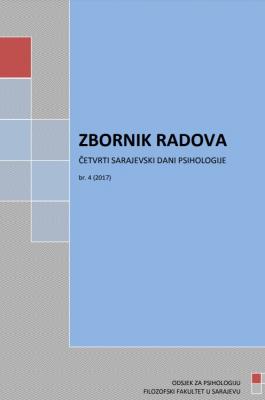Validacija skale profesionalnih interesa u psihologiji
Psychometric properties of the questionnaire of vocational interests in psychology
Author(s): Ivona Čarapina, Damir Aljić, Anita Kožul, Katarina Matuško, Ružica Perković, Ana OstojićSubject(s): Cognitive Psychology, Clinical psychology, Methodology and research technology, Health and medicine and law
Published by: Filozofski fakultet Univerziteta u Sarajevu
Keywords: metric characteristics; vocational guidance; counseling;
Summary/Abstract: Vocational guidance and counseling are important elements of the education system in all developed countries. Most of the instruments for professional orientation are intended for students in high schools, while there are not enough instruments for assessing professional interests in the different professions. The aim of this study was to investigate the metric characteristics of the Scale of professional interests in psychology (Burtaverde, 2015). This scale was applied in electronic form to a sample of 108 participants, psychology students from the first to the fifth year of study (89.6 % women, 10.4 % men), aged 18–25 years (M = 20.53, sd = 1.31). The scale consisted of 90 items. Participants assessed each statement on a scale from 1 to 5 (1 = not at all apply to me, 5 = fully applies to me) depending on the extent to which the statement describes their interest in specific areas of psychology. The method of main component analysis with varimax rotation extracted 8 factors, which is not in accordance with the factor structure of the original scale where 9 factors were found. The first factor, named as organizational and applied psychology consisted of 20 items (α = .85), the second factor named as clinical psychology and psychotherapy consisted of 23 items (α = .75), the third factor, named as military psychology consisted of 12 items (α = .80). The fourth factor named as judicial psychology consisted of 9 items (α = .81), the fifth factor named as scientific research consisted of 10 items (α = .81), the sixth factor named as psychology of sport consisted of 3 items (α = .82), the seventh factor named as career counseling consisted of 7 items (α = .80) and the eighth factor named as health psychology consisted of 6 items (α = .83). Reliability of the total scale is high (α = .83). After varimax rotation with these eight factors a total of 57.55 % of the variance is explained (first factor = 20.30 %, the second factor = 11.63 %, the third factor = 8.18 % , fourth = 4.65 %, fifth = 3.84 %, sixth = 3.25 %, seventh = 3.06 %, eighth = 2.64 %). The standard deviation and range showed a satisfactory sensitivity of the scale. Distribution of the results for all eight factors is negatively skewed, except for the factor of judicial psychology where the distribution is positively skewed. The shape of distribution is leptokurtic for the factors of scientific research and psychology of sport, while the shape for the remaining six factors is platykurtic. Metric characteristics of the scale are satisfactory and further application of the scale for the purpose of career counseling for psychology students is recommended.
Journal: SARAJEVSKI DANI PSIHOLOGIJE: ZBORNIK RADOVA
- Issue Year: 4/2017
- Issue No: 4
- Page Range: 104-116
- Page Count: 13
- Language: Bosnian

